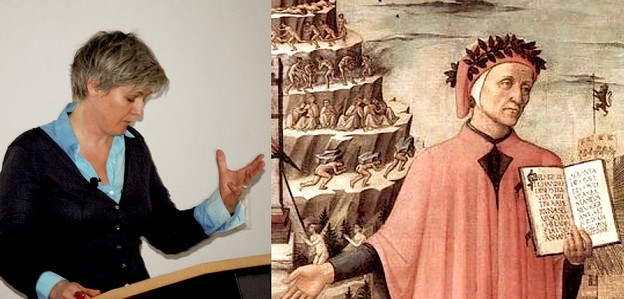
The straight path gone astray (PoemTalk #64)
Caroline Bergvall, 'VIA'

Amaris Cuchanski, David Wallace, and Laynie Browne converged on the Writers House one day recently to talk about a remarkable performance piece (later text) by Caroline Bergvall, “VIA.” In the piece, Bergvall intones forty-seven English translations of the opening tercet of Dante Alighieri’s Inferno (1321): “Nel mezzo del cammin di nostra vita / mi ritrovai per una selva oscura / ché la diritta via era smarrita.” She arranges the translations alphabetically according to first word, from “along” to “when,” reciting the translator’s name and date after each. Our PoemTalkers discuss the poem’s pre-textual state as aural performance, the remarkable title which seems to connect every manner of issue and mode, the relative literary value and literary-historical place of individual verse translators, translation itself as inherently open, and, of course, the ur-relevance of Dante’s always-interpretable infernal foray into the experience of being lost in words.
The recording of “VIA” we are using in here was first made in 2000, and later (in 2005) included in Rockdrill CD #8, published by the Contemporary Poetics Research Centre at Birkbeck College, produced  by Colin Still and used with his permission. The CD is titled Caroline Bergvall, Via: Poems 1994-2004 but the recording made available, in addition to “VIA,” Ambient Fish, 8 Figs, About Face and other pieces. The text of “VIA” was published in Chain magazine’s 10th issue — a special number devoted to translation — in the summer of 2003 (pp. 55-59), and thus of course postdates the performance. PoemTalk listeners new to Bergvall will surely benefit from a look and listen at Bergvall’s PennSound page, where one can hear her discuss topics relevant to the work of “VIA”: translation in relation to cultural traffic between languages, rethinking identity in relation to language, the translation of live performance to text, the problematics of text and performance, and more. Jacket2 has published Genevieve Kaplan’s essay on “VIA” called “How we read Caroline Bergvall’s ‘Via’ and Why we should care” and Brian Reed's essay titled “‘Lost Already Walking’: Caroline Bergvall's ‘VIA’.” Laura Goldstein has published an essay on “VIA” that focuses on translation as performance. (Above from left to right: Amaris Cuchanski, David Wallace, Laynie Browne.)
by Colin Still and used with his permission. The CD is titled Caroline Bergvall, Via: Poems 1994-2004 but the recording made available, in addition to “VIA,” Ambient Fish, 8 Figs, About Face and other pieces. The text of “VIA” was published in Chain magazine’s 10th issue — a special number devoted to translation — in the summer of 2003 (pp. 55-59), and thus of course postdates the performance. PoemTalk listeners new to Bergvall will surely benefit from a look and listen at Bergvall’s PennSound page, where one can hear her discuss topics relevant to the work of “VIA”: translation in relation to cultural traffic between languages, rethinking identity in relation to language, the translation of live performance to text, the problematics of text and performance, and more. Jacket2 has published Genevieve Kaplan’s essay on “VIA” called “How we read Caroline Bergvall’s ‘Via’ and Why we should care” and Brian Reed's essay titled “‘Lost Already Walking’: Caroline Bergvall's ‘VIA’.” Laura Goldstein has published an essay on “VIA” that focuses on translation as performance. (Above from left to right: Amaris Cuchanski, David Wallace, Laynie Browne.)
This episode of PoemTalk was directed and engineered by Chris Martin, hosted and produced as always by Al Filreis, and edited expertly once again by Steve McLaughlin. We at PoemTalk wish to thank the Poetry Foundation for co-sponsoring the series, and, in particular there, Cathy Halley and Nuria Sheehan.
We are pleased to share Steve Benson’s response:
I found it fascinating in listening, afterward, to the recording, and recognizing many of the translators' names, and, so far as I caught them, I recognized none of the translators as women. So far as I can remember, issues relating to gender were not brought up in this particular conversation. But, after all, in this text, gender is pervasively male: the “I” and the “my” and the “myself” in the translations always refer to a male identified with the figure of Dante Alighieri. Might not Bergvall be remarking on something here too? It seems she is handling, by her precise patient focused reading, the translation craftwork of so many dozen males, each contemplating the same single existential situation, one that strikes me as archetypally male: he finds himself radically disconnected, island-like, off task, on a sort of involuntary quest for orientation, lost in it, uncertain of its purpose or ground. How is she handling these as a woman? It seems to me she attentively, impartially vocalizes each of these tercets like prayer beads on a string, neither objecting nor venerating. They are facts, acts, things, and she witnesses them, attends to them, one at a time, as part of a larger fabric -- the weave of her generating attention between them, as well as the implicit context (which might be identified as the Comedia, Western male-dominated culture).
I gather from Wikipedia that Dorothy Sayers felt her translation of the Comedia was her own major contribution. Maybe there are more women translating Dante than I realized.